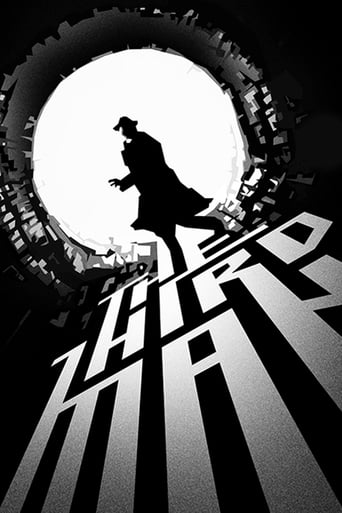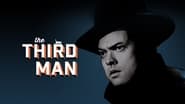adonis98-743-186503
Pulp novelist Holly Martins travels to shadowy, postwar Vienna, only to find himself investigating the mysterious death of an old friend, Harry Lime. I was expecting 'The Third Man' to be some awesome Noir thriller but instead we get the boring version of it like seriously i get it some of those movies back in the 30's and 40's did well for their time but now in 2018? They look pretty terrible, sound terrible and their just either very boring or very long and this movie is on the first side of things. Some people will enjoy it but others will just get bored by it. (0/10)
JohnHowardReid
Graham Greene's contemporary variant on the Dracula legend is one of the most watchable films ever made. (Dracula? Think about it. Postwar Vienna, a whole city of crumbling towers and ruined splendors = Dracula's castle. And Dracula himself, a vampire brought back to life from "death", dressed all in black, who flees from the light and gorges himself on human blood, yet is a charming fellow withal: fluently fascinating, casually contemptuous, lightheartedly ruthless, cheerfully sinister. Even the second death does not kill his powers. Over Anna, for instance). Yes, this engrossing, masterfully designed thriller stands as my favorite suspense film. And the number one choice of a large number of other commentators too. Not to mention the general public. I think the reason for such universal acclaim is that the script operates so successfully on so many different levels. A thinking man's film, but the thinking nowhere gets in the way of the simple chase and suspense excitements, mounted against such an exotic background as postwar Vienna. In fact, the ordinary entertainment seeker who thrilled to the pursuit, the mystery, the intrigue, the twists and surprises, the terrors, the romance of the basic plot, would probably be surprised to learn there was anything more to the movie, aside from the facts that it was involvingly acted, atmospherically presented, and scored in an astonishingly novel yet gripping way with zither music. The acting is superlative too. Joseph Cotten has one of his best roles as the naïve, second-rate writer who blunders through the labyrinthine ways of a decaying city to find his alter ego-Orson Welles in a memorable performance that outshines even his Citizen Kane. Oddly, Alida Valli's moody, beautifully understated yet perfectly-in-tune portrayal of the girlfriend who knows more than she pretends, who expresses less than she feels, was not properly appreciated by contemporary critics. Perhaps we cannot blame them. It is only on a third or fourth viewing that the spectator can penetrate Anna's mind, can see through her devices, her little subterfuges, so that her absolute rejection of Martins in the film's famous final scene comes no longer as a surprise, but is the logical and only outcome of feelings and emotions she has subtly hinted at through voice and gesture right throughout the movie. However, the principals are not the only actors in The Third Man. It always amazes me that so many critics even today comment only on the well-known British and American stars. Everybody talks about the blundering, self-centered, morosely manipulative Cotten; the enigmatic, expressively introspective charm of Valli; the mercilessly unremorseful, light-hearted banter of Welles; the rough-and-ready cynical sincerity of straight-from-the-shoulder Howard; the admiring, quick-reflexed yet ideally subordinate Bernard Lee; the wonderfully diffuse bonhomie of Wilfrid Hyde-White. But few critics talk about the German-speaking players, particularly Ernst Deutsch (Baron Kurtz) with his sanpaku eyes and rubbery smile; or Erich Ponto (Dr Winkel), with his craggily carved features and his amusing insistence on the correct pronunciation of his surname; or the menacingly heavy-set Siegfried Breuer (Popescu); or the repentantly volatile Paul Hoerbiger (the porter). With the exception of Ernst Deutsch, who was mainly based in the theatre, these players enjoyed extraordinarily lengthy cinema careers. Karas' contrapuntal and atmospherically moody zither music, along with Krasker's sinisterly somber cinematography, perhaps deservedly receive most of the technical hurrahs from critics and public. A pity these praises sometimes overlook such features as Reed's painstakingly meticulous direction and Oswald Hafenrichter's fast-paced film editing that often cuts in time or tune with the zither beats on the soundtrack.
boyan-denizov
I expected much more from this film, as usually they claim it to be a classic movie, one of the best in history of cinema etc. But in my opinion it isn't. It has too many shortcomings. First of all -- the music is totally inappropriate for such a thriller, it is mocking and amusing, which does not fit with the whole story at all. It makes it all look like a light-hearted comedy, not to be taken seriously. The dialogues are presented in a mechanical, artificial way: normal people do not respond so quickly to surprising and unknown information. The plot fixes too much attention to the girl, rather than to the complex and confused story. The good things are the cinematography and the atmosphere of postwar Vienna, where the action takes place, but even they should have been given more attention.
gottdeskinos
As a film-noir fan I though to myself this might be one of the best settings: Post-war Vienna with bombed buildings, a multinational police force by the occupying countries, investigation on black market dealings, foreign languages and accents all around. The main actor: an American who doesn't speak German, who learns his friend died in a mysterious accident.
But sadly they failed to use this setting and the premise to create suspense for almost the entire movie. It's not the cinematography's fault, which is excellent: Long shadows on Vienna's places while people are being chased. Hm, but something seems off about it. They thought let's put it in traditional Austrian music for the soundtrack, well, because it's Vienna. But this is the kind of cheerful music that fits when you're strolling through the streets in bright daylight with a smile on your face and a lady in your arms. It certainly is the wrong choice for a supposedly suspenseful foot chase. Or when you surprisingly see your presumed dead friend across the street. Or while you're in a children's hospital. Or when people are digging at a graveyard at night and reveal who the "third man" was. It kills all mood in a black and white thriller and becomes almost absurdly comical. I guess they felt eager to try out new things.
Thank god they dropped it when Orson Welles showed up and they talked eye to eye on the Ferris wheel. Great acting. Another great scene was the chase in the sewer. This redeemed the movie a bit. But after thinking about it I noticed there are plot holes. The soundtrack achieved at least one thing: it distracted me enough to not think about the plot too much.














